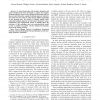2439 search results - page 36 / 488 » Learning to Coordinate Behaviors |
HICSS
2003
IEEE
14 years 21 days ago
2003
IEEE
Basically, instrumental conditioning is learning through consequences: Behavior that produces positive results (high “instrumental response”) is reinforced, and that which pro...
ATAL
2008
Springer
13 years 9 months ago
2008
Springer
Virtual health counseling agents on mobile devices need to be able to interrupt their users when it is time for them to engage in healthy behaviors, such as scheduled medication t...
EAAI
2008
13 years 7 months ago
2008
Multi-agent systems allow the simulation of complex phenomena that cannot easily be described analytically. Multi-agent approaches are often based on coordinating agents whose act...
CDC
2009
IEEE
13 years 11 months ago
2009
IEEE
A closed-loop model with actuator dynamics and sensory feedback has been developed to capture the complex postural behaviors observed in a human head tracking task. In motor-contro...
AROBOTS
2004
13 years 7 months ago
2004
In this paper, we introduce a self-assembling and self-organizing artifact, called a swarm-bot, composed of a swarm of s-bots, mobile robots with the ability to connect to and to ...

